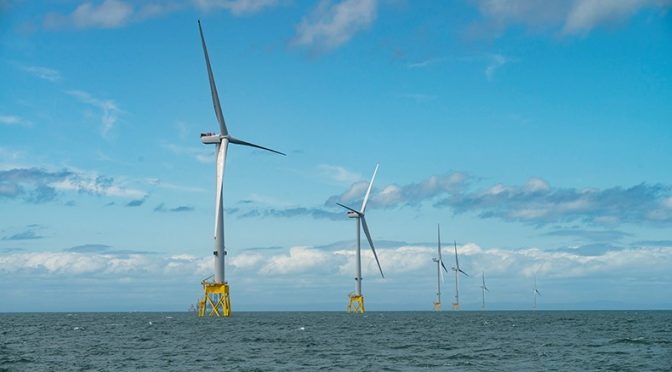Offshore wind has been the UK’s greatest technology success story in the last decade: an industry where the country has developed genuine global leadership.
Right now, the world’s biggest offshore wind farm is being built off the Yorkshire coast. Dogger Bank is the size of Greater London and when complete will produce enough clean homegrown energy to power 6 million homes.
The country should be rightly proud of the role it has played in pioneering a future-facing technology that has three great advantages.
It strengthens national security by making us less dependent on importing energy, it’s carbon-free and, critically, it’s far cheaper than alternatives with costs falling by around 70% over the last decade.
And it’s about more than just energy. It’s about industrial strategy. This is a technology that is needed all over the world – and the UK has, until now, been at the leading edge.
Offshore wind can bring huge inward investment, new manufacturing facilities, job creation and export opportunities at a time when economic growth is at a premium.
No wonder other countries are scrambling to catch up.
Maintaining momentum
But having made a great start, the challenge is how the UK maintains momentum.
There is no doubt the failure of the recent auction to bring forward any offshore wind projects is a setback.
Inflation and interest rates mean the costs of building massive infrastructure projects like offshore wind farms, have increased significantly – albeit from a low base.
This wasn’t reflected in the prices offered to developers. So, the auction failed to deliver the additional capacity the country needs to deliver its energy security targets.
And while the very limited relaxation of planning rules for onshore wind in England is welcome – because we will need all the homegrown energy we can get – onshore can’t match offshore for scale and impact. After all, the UK is a densely populated country with limited land but an abundance of coastline and this means offshore is the big prize.
So, we now find ourselves at a crossroads.
Decisions taken in the coming weeks and months will dictate whether we can recover our leadership position and all the benefits this brings, or let it slip.
Assuming it does galvanise the urgent action we need, I see reasons to be positive.
We can fix this
There remains an enormous appetite to invest in the UK.
We can fix this and build something even more significant in the process.
Here is how.
Firstly, the prices set by government need to be sustainable and recognise rising costs in supply chains and financing that have impacted every industry and every household.
The cap, or Administrative Strike Price as it is known, in the recent auction round was set at around £60/MWh in today’s prices.
In contrast, Ireland’s recent fully subscribed auction, cleared at around £74/MWh.
We know that offshore wind will help insure us from the price spikes we have seen recently. And of course, you also get stronger energy security and climate action free as part of the bargain.
Making it easier to invest and creating good green jobs
But there are other non-price related reforms too such as extending contract lengths from 15 to 20 years as they do in the US and extending capital allowances to help cushion increasing costs.
And, there is also a bigger opportunity.
By making the UK the easiest place in the world to invest in and build renewables we can kickstart an industrial renaissance.
‘Good green jobs’ is not just a slogan but increasingly a reality. Dogger Bank wind farm is already supporting around 2,000 jobs in the North East of England.
Our next major offshore project, at Berwick Bank off the east coast of Scotland, could create around 9,000 jobs across the UK.
Investment, growth, jobs, strengthened national security: the prize is significant for the UK if we are willing to be agile enough to seize it.
And if we don’t, we can be sure others will. As a pioneer, the UK was able to build its competitive advantage in clean energy without much competition.
This is no longer the case.
The energy crisis means we are now in a global race.
In Aesop’s famous fable complacency hampered the hare enabling the tortoise to win. It’s a good lesson.
It’s time for the UK to pick up the pace, not slow down.

Alistair Phillips-Davies
Chief Executive


